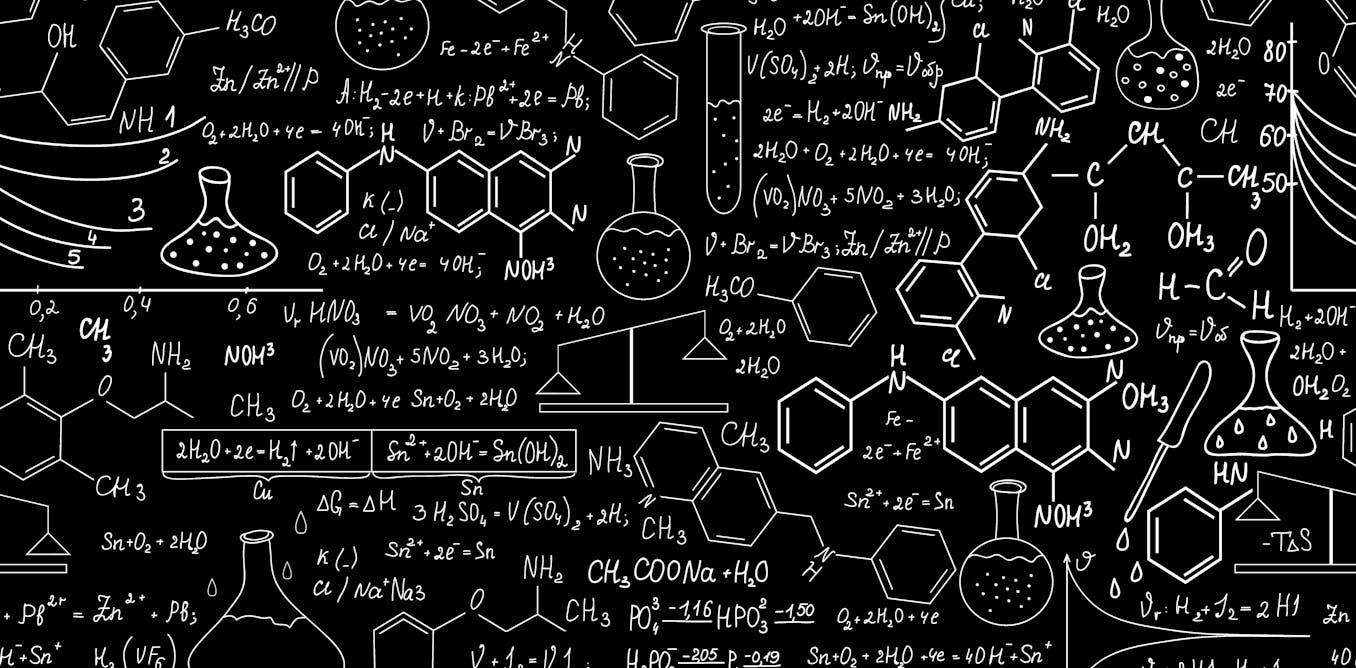Credit for the image :https://theconversation.com
Connect with Me on Facebook
Add me on Facebook(Manoj Acharya)
Connect with Me on Facebook
Pokhara University
Faculty of Science and Technology
Course No.: xxx xxx
Course Title: Applied Chemistry (2-1-2)
Full Marks: 100
Pass Marks: 45
Nature of the Course: Theory & Practical
Time per Period: 1 hour
Level: Undergraduate
Total Periods: 30
Program: BE
Course Description
This Applied Chemistry course is designed to learn to use different materials without causing any wastage or pollution, helping engineers handle a wide range of materials correctly. The course covers the selection of elements for solving engineering problems from the 118 known elements.
General Objectives
- Focus on the general application of chemical principles to analyze and evaluate engineering problems, such as developing engineering materials.
- Make students aware of the proper and safe handling of engineering materials to protect themselves and the environment.
Methods of Instruction
General trends of instruction for class delivery include marker pen whiteboard, PowerPoint presentations, group discussions, practical observations, and laboratory activities.
Syllabus in Detail
Unit I: Electrochemistry and Battery Technology (6hrs)
- Electrolytic cell and its application
- Introduction to Galvanic cell and examples, electrode potential, EMF of the cell and cell representation.
- Electrochemical series & its application
- Electrochemical theory of corrosion and its preventions.
- Batteries and their importance, Classification of batteries- primary, secondary, and reserve batteries with examples.
- Construction, working, and applications of: Zn-Cu, Ni-Cd, Lithium-ion, and Sodium-ion battery.
Unit II: Environmental Chemistry (5hrs)
- Air, Water, and Soil Pollution: causes, effects, and control measures
- Water Quality Analysis
- Alkalinity
- Hardness
- Free Chlorine
- Dissolved Oxygen
- Chemical Oxygen Demand
Unit III: Transition Elements and its Applications (4hrs)
- Introduction to transition elements and its position in the periodic table
- Characteristics of transition elements: Electronic Configuration, Atomic radii, Variable oxidation states, Complex formation, Colour and Magnetic Properties, Catalytic property
- Applications of Transition metals in various engineering fields
Unit IV: Types of Organic Reactions (4hrs)
- Substitution reaction: SN1 and SN2 reactions, mechanism, kinetics, stereochemistry, reactivity, factors affecting this type of reaction.
- Elimination reaction: E1 and E2 reactions, mechanism, kinetics, orientation (Saytzeff’s rule), reactivity, factors affecting this type of reaction.
Unit V: Engineering Materials and its Applications (7hrs)
- Explosives, Cement, Paints, Sensors, Photovoltaic cells
Unit VI: Polymers and its Applications (4hrs)
- Polymers, Addition, condensation, and copolymerization
- Preparation, properties, and uses of PVC, Teflon, Silicone Rubber, and Neoprene
- Concept of conducting, non-conducting, biodegradable, and non-biodegradable polymers, examples, and their applications
Tutorials
- Problems related to various course units
Laboratory Works
- Various laboratory experiments related to the course content
Evaluation System and Students’ Responsibilities
Evaluation System
| External Evaluation | Marks | Internal Evaluation | Weight |
|---|---|---|---|
| Semester-End examination | 50 | Theory | 30 |
| Attendance and Class Participation | 10% | Assignments | 20% |
| Presentations/Quizzes | 10% | Term exam | 60% |
| Practical Exam/Project Work | 40% | Viva | 30% |
Total Internal
Full Marks: 50 + 50 = 100
Student Responsibilities
Each student must secure at least 45% marks in internal evaluation with 80% attendance in the class to appear in the Semester End Examination. Failing to get such a score will be given NOT QUALIFIED (NQ), and the student will not be eligible to appear in the Semester-End Examinations. Students are advised to attend all the classes, formal exams, tests, etc., and complete all the assignments within the specified time period.
Prescribed Books and References
Text Books
- Maron, S. H. & Prutton, C. Principle of Physical Chemistry, Oxford & IBH Pub. Co.
- Lee, J. D. Concise Inorganic chemistry; John Wiley and sons; Inc.
- Morrison, R. T. & Boyd, R.N. Organic chemistry. Prentice-Hall of India Pvt. Ltd.
References
- Madan, R. D. & Prakash, S. Modern Inorganic Chemistry. New Delhi: S. Chand publishing.
- Bahl, B. S. & Bahl, A. A Text Book of Organic Chemistry; New Delhi: S. Chand publishing.
- Jain and Jain, A Text Book of Engineering Chemistry. New Delhi: Dhanpat Rai Publications.


